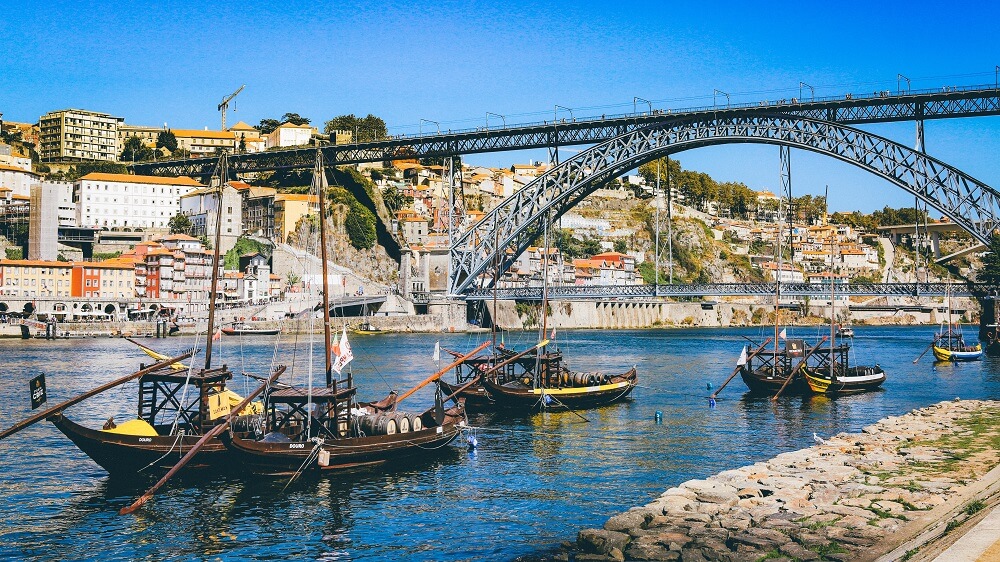Should you rent a car in Portugal? Or can you get around solely using public transport?
It is possible to visit many of Portugals’s top destinations via public transport or organized tours. But remote locations may require a significant amount of planning and effort to reach without your own vehicle. Ultimately, the decision to rent a car or use other modes of transportation will depend on the trade-offs between cost and convenience.
To make decide how to get around Portugal, there are several factors to consider. How long is your trip? How many people are you travelling with? Where are you planning on travelling to? and of course, what’s your budget?
To help you decide whether renting a car is worth the investment, here are some key considerations to keep in mind for each transportation option.

Transport options in Portugal
1. Hire a car
Undoubtedly, having your own car is the easiest and most convenient way to explore Portugal. Additionally, if you are travelling with a group, it may not even be the most costly option. Renting a car with multiple people can reduce the cost per person, whereas other modes of transportation maintain the same cost per person.
Advantages of hiring a car in Portugal
The convenience and flexibility of having a rental car cannot be overstated. You have the freedom to choose your own itinerary, travel at your own pace, carry your stuff, and make pit stops whenever necessary.
Disadvantages of hiring a car in Portugal
The primary drawback of renting a car is the expense. In addition to the rental fee, there are other costs to consider, such as insurance, fuel, tolls, and parking. These expenses can add up quickly and make renting a car very expensive if only one or two people are sharing the cost.
If you plan to stay in urban areas, finding parking can also be a challenge. Certain historical centres may prohibit vehicle access unless you have a resident permit. Lastly, driving a car in a foreign country can be stressful and overwhelming if you are not a confident driver.
2. Organised tours
Having worked for a tour company for several years, I know a bit more about organised tours than the average person. When selecting a good tour, my advice is to read the reviews, choose smaller groups, and avoid tours that try to see too much in one day.
Advantages of organised tours in Portugal
By joining a well-organised tour with an engaging guide, you will have the opportunity to learn more about Portugal. A good guide can also offer insider tips on the area. If you get a good group, it can also be an opportunity to make some friends. And you’ll save yourself the hassle of organising everything, so you can enjoy the day.
Disadvantages of organised tours in Portugal
On the other hand, if you join a poorly organized tour, it can feel like a huge waste of time and money. Unless you opt for a private tour, you will have little control over the itinerary. It can feel like being herded around with a group of strangers with little opportunity to explore at your own pace.

3. Public Transport in Portugal
Portugal boasts an extensive public transportation system that includes trains, buses, funiculars, coaches, ferries and trams. Public transport is a cost-effective option for visiting the most popular destinations and getting around larger cities. However, it can be a challenge for travelling long distances and reaching places outside of major tourist areas.
Advantages of travelling by public transport in Portugal
Travelling solo? Public transport is by far the cheapest way to get around. You won’t have to worry about parking, driving stress, or risking a DUI (or worse) after a few too many ginjinhas. Sit back and enjoy the scenic views!
Disdvantages of travelling by public transport in Portugal
With public transport, you are restricted to set timetables and routes. It’s typically the slowest way to get around, especially if your route includes connections. Inter-city trains can be quite expensive, so it may not be the most cost-effective option for groups. Many remote areas and attractions are not accessible by public transport. Additionally, you will have to carry your own luggage.
4. Flying around Portugal
Although you can fly between cities and major destinations in Portugal, it’s not worth it. The carbon emissions alone are a concern. But once you factor in travel time to and from the airport, waiting at the airport, and transportation to your final destination, you don’t save much time.
Advantages of flying in Portugal
Hopefully you’ll get a window seat and enjoy the view.
Disadvantages of flying in Portugal
Excessive carbon emissions for short distances, cost, and dry skin.
Taxis and ride-share apps
Taxis and rideshare services like Uber are affordable and convenient options for travelling within major cities in Portugal.
Advantages of taxis and ride-share apps
Taxis and rideshares are available and convenient in large cities. The cost is reasonably cheap when travelling short distances.
Disadvantages of taxis and ride-share apps
Rideshare services are not available outside of major cities. They are not practical for longer trips.
So, should I rent a car?
If your travel plans are limited to Lisbon or Porto, renting a car may not be necessary. However, if you plan on exploring areas beyond these two cities, renting a car may be a good option if it fits within your budget. But be sure to consider all the associated expenses. Have you had any experience with getting around Portugal?

